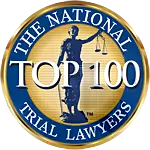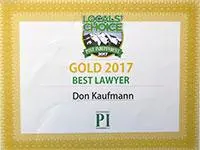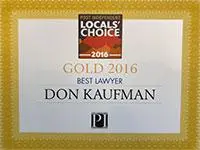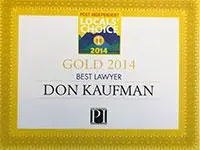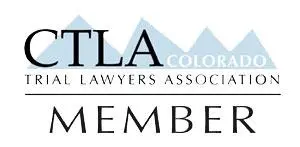As of August 23, 2021 – Yes. (Depending on the facts as usual)

Can an employer require a SARS-CoV-2 (COVID-19) Coronavirus vaccination?
Update: The federal COVID-19 PHE declaration ended on May 11, 2023.
Update: August 23, 2021 8 AM MST.
The US Food and Drug Administration on Monday, August 23, 2021 – granted full approval to the Pfizer/BioNTech Covid-19 vaccine for people age 16 and older. This is the first coronavirus vaccine fully approved by the FDA and is expected to open the door to more vaccine mandates.
The Pfizer/BioNTech vaccine has been authorized for emergency use in the United States since mid-December 2020, for people age 16 and older. In May, the authorization was extended to those 12 and older. Out of more than 170 million people in the United States fully vaccinated against Covid-19, more than 92 million have received the Pfizer/BioNTech vaccine.
Are vaccine mandates for work legal?
THE ANSWER. Yes, a private company is now allowed to mandate FDA approved vaccines for their staff members, so long as they provide an exemption for medical or sincerely held religious reasons.
****************************************************************
Update: The Federal District Court in Houston, Texas, ruled on June 12, 2021, that terminating employment for failure to vaccinate is legal. The case is attached below. Jennifer Bridges, et al., v. Houston Methodist Hospital, et al., Civil Action H-21-1774 June 12, 2021
Generally, district court opinions are not binding on other district courts. So this decision does not bind the federal district court in Colorado. Colorado could render an opinion different than the opinion in Texas – at this time.
In Texas, it is now legal to fire a person for failure to get the SARS-CoV-2 (COVID-19) Coronavirus vaccine. In Colorado, it is still an open question that has not been decided by the courts. (Colorado considerations are addressed after the case below)
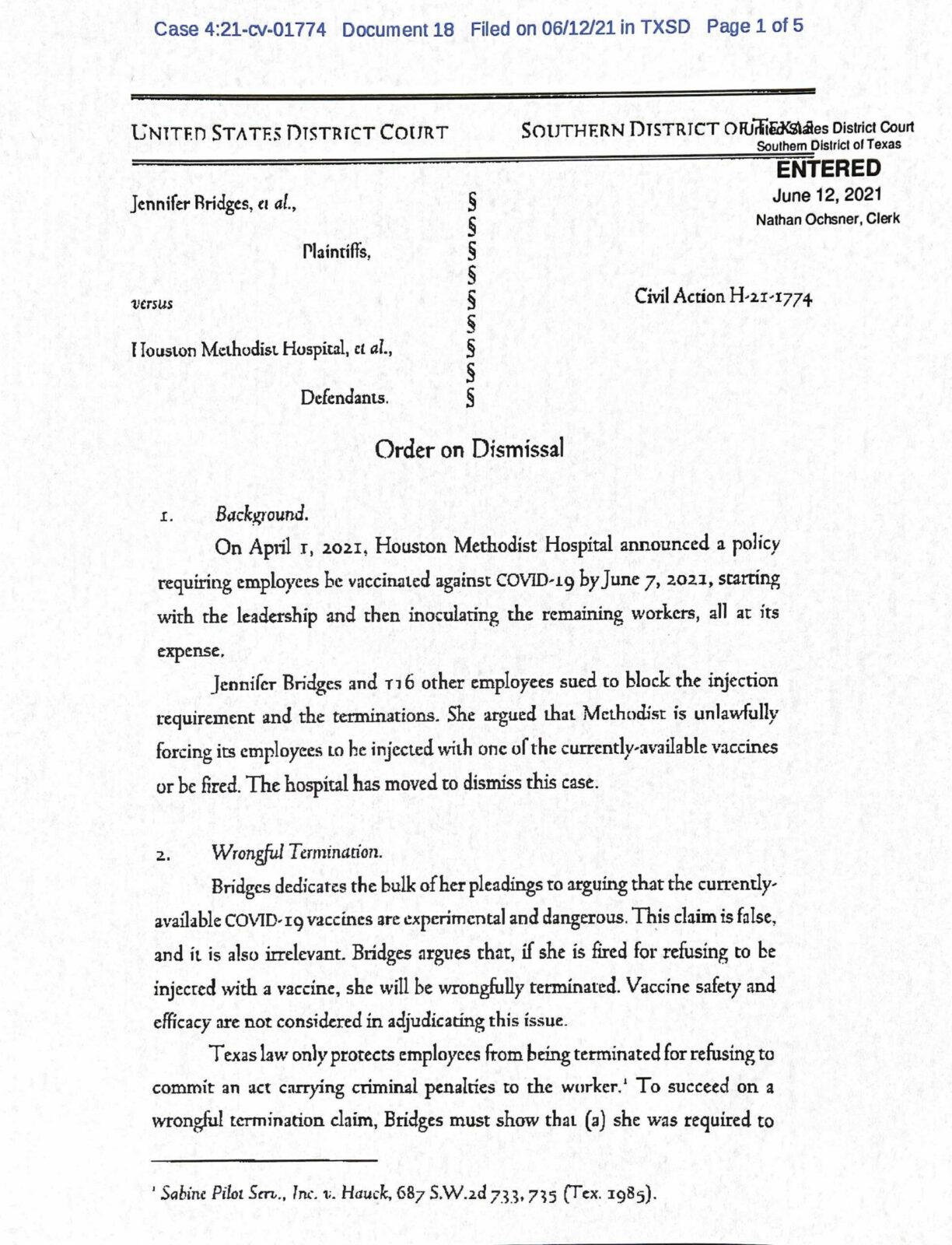
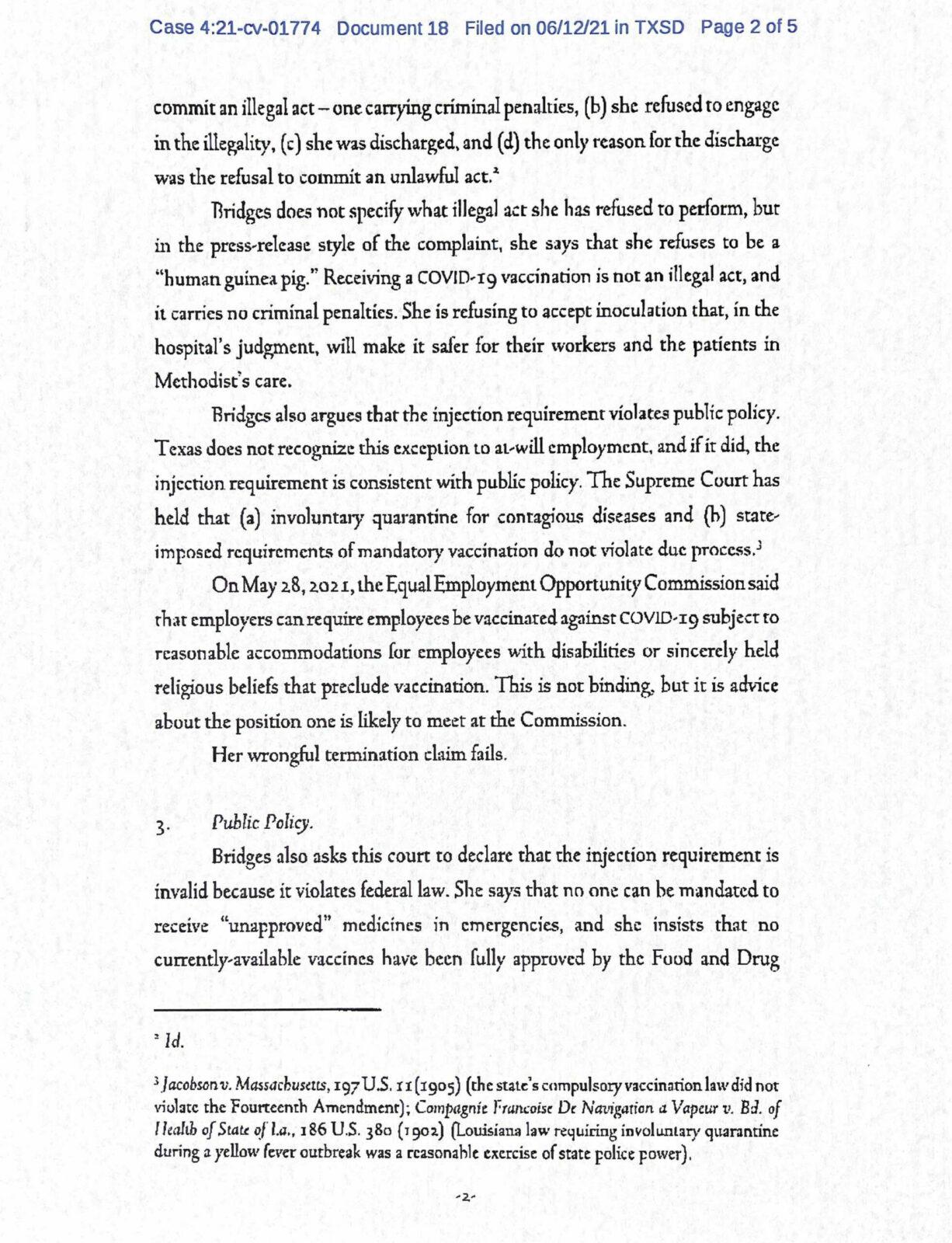
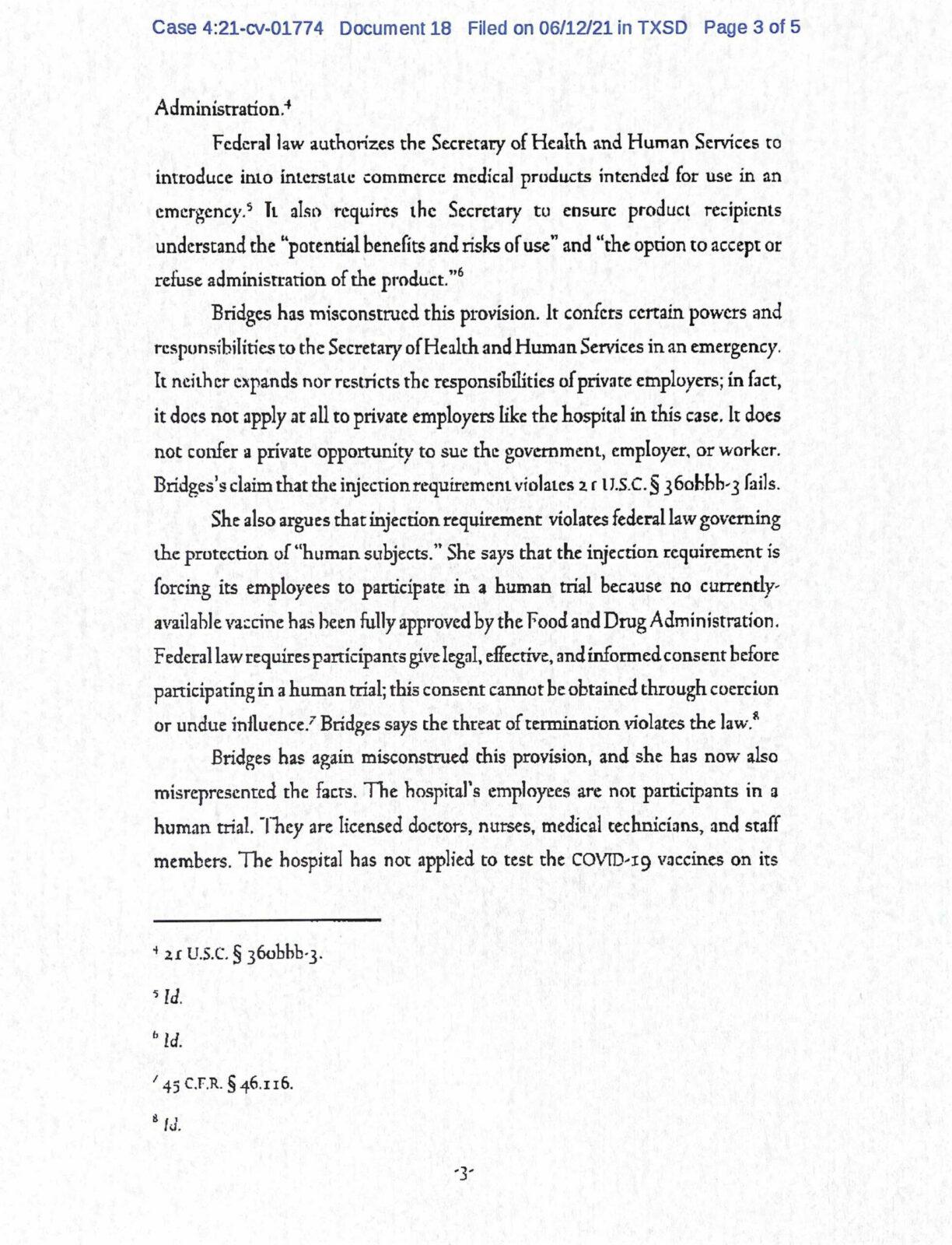
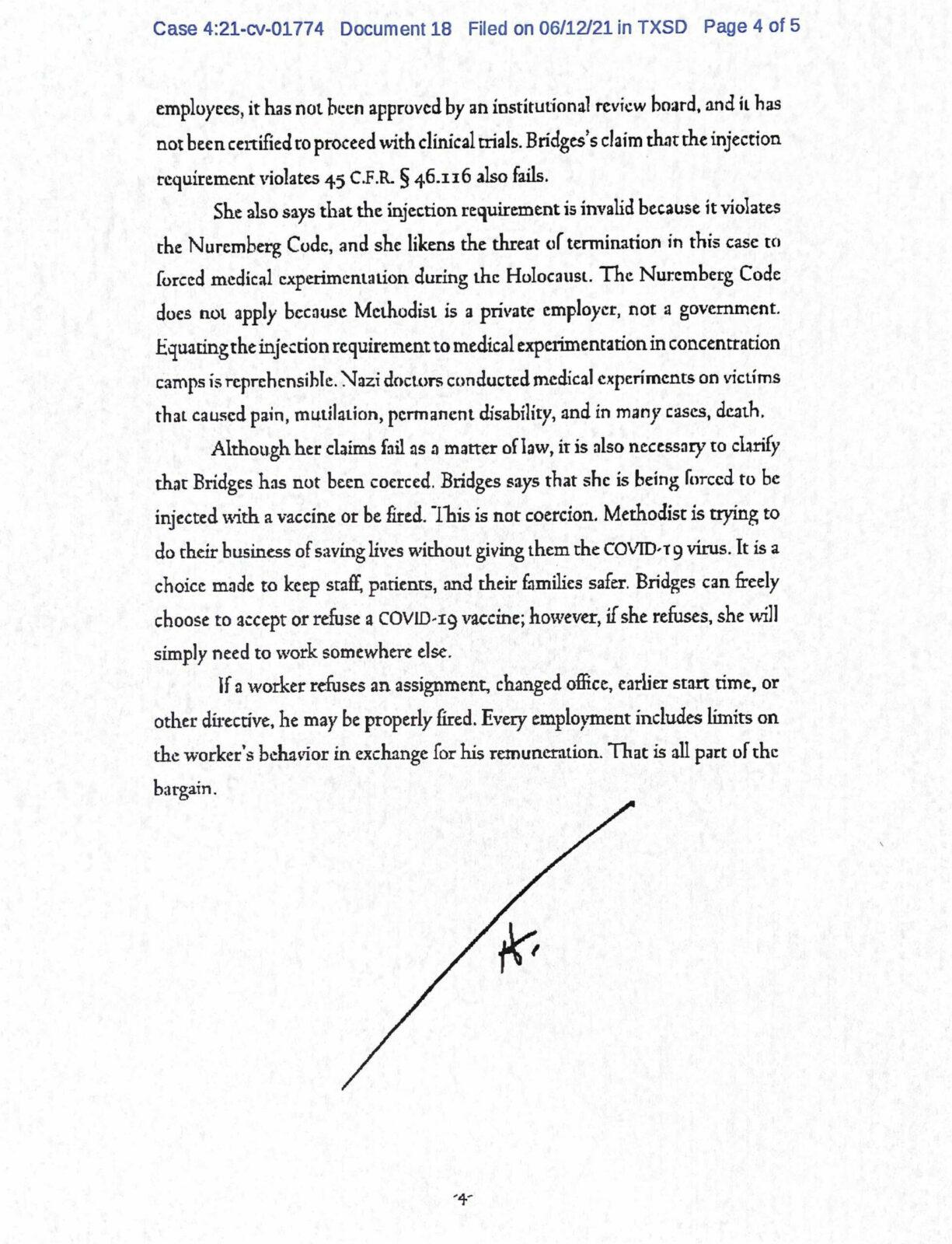
![Order on Dismissal Page 5 [Final Page]](https://glenwoodattorney.com/wp-content/uploads/2021/04/Vaccine-5-scaled.jpg)
Relevant law to consider in COLORADO:
- Disability discrimination. COVID-19 has killed over half a million Americans and made over thirty million Americans sick. The employer can’t mandate vaccinations under the ADA unless they’re “job-related and consistent with business necessity” (including when necessitated by a “direct threat”). As all businesses have been impacted by the pandemic, in almost all circumstances, requiring the COVID-19 shot would satisfy the ADA standard. However, the Act still requires exemptions if employees have ADA-covered disabilities that may prevent them from taking the vaccine. For ADA-protected employees, the employer must consider “reasonable accommodations” such as an exemption or additional personal protective equipment. The Act requires the employer to explore and resolve the issues through the interactive process and provide accommodations absent undue hardship.
- Religious discrimination. Title VII requires the employer to accommodate employees who can’t take a vaccine because of a “sincerely held religious belief, practice, or observance.” Like with the ADA, the employer must reasonably accommodate employees’ qualifying religious objections under Title VII, at least absent “undue hardship” to the business, although the standard in the religious context is less stringent for employers than under the ADA.
- Employer liability. The employer may encounter pitfalls both for requiring and not requiring COVID-19 vaccinations. For mandated shots, the employer must consider the possibility of workers’ compensation liability if employees have adverse reactions. Mandatory vaccinations form the basis of a viable workers’ compensation claim. Worse for the employer, OSHA’s General Duty Clause requires the employer to furnish a workplace “free from recognized hazards that are causing or are likely to cause death or serious physical harm” to employees. They may argue any workplace that doesn’t mandate vaccines against COVID-19 violates the provision. Lastly, a worker could introduce COVID-19 into the workplace, injuring or killing the customer, making the employer and employee civilly liable for failing to act reasonably in a global pandemic.
- The Covid-19 Vaccine is not fully approved by the FDA. The FDA’s guidance on emergency use authorization (EUA) of medical products requires the FDA to “ensure that recipients are informed to the extent practicable given the applicable circumstances … That workers have the option to accept or refuse the Emergency Use Approval (EUA) product …”. Dr. Amanda Cohn, the executive secretary of the CDC’s Advisory Committee on Immunization Practices, was asked if Covid-19 vaccination can be required; she responded that under a EUA, “vaccines are not allowed to be mandatory. So, early in this vaccination phase, individuals will have to consent, and they won’t be able to be mandatory.” Cohn later affirmed that this prohibition on requiring the vaccines applies to organizations, including hospitals. When the FDA grants emergency use authorization for a vaccine, many questions about the product cannot be answered. Given the open questions, when Congress granted the authority to issue EUAs, it chose to require that every individual should be allowed to decide for himself or herself whether or not to receive a EUA product. The FDA and CDC consider this fundamental requirement of choice important enough that even during the height of the Covid-19 pandemic, they reinforced that policy decision when issuing their guidance related to the Covid-19 vaccines.
While it is not legal to require a COVID-19 vaccine, IN COLORADO, at this time, with more 309 million doses administered, fully vaccinating over 144 million people or 43.4% of the total U.S. population, full FDA approval is expected soon. When full approval occurs, in an “at-will” state such as Colorado, it would appear lawful to require vaccination as a condition of employment.
The Law Offices of Donald J. Kaufman is a Colorado Workers’ Compensations Attorney representing only injured workers who have been injured in Colorado. His focus is protecting the rights of injured workers’ and their families. With over 27 years of experience, Kaufman and his firm has helped thousands of injured Colorado Workers. Attorney Kaufman helps injured workers in Glenwood Springs, Rifle, Silt, New Castle, Carbondale, Basalt, El Jebel, Aspen, Dotsero, Craig, Meeker, Rangely, Debeque, Minturn, Vail, Eagle, Gypsum, Leadville, Paonia, Frisco, Breckenridge, Loveland, Denver, Grand Junction and Steamboat. Se habla espanol. Abogado de Colorado. Kaufman maintains security audio/video cameras in and around his office to protect the clients and offices. Attorney makes no express or implied guarantees concerning any outcomes. Donald J. Kaufman is responsible for the content on this website. This information is not to be interpreted as providing legal services, nor as proposing any form of legal advice. Anyone considering a lawyer should independently investigate the lawyer’s credentials and ability, and should not rely upon advertisements or self-proclaimed expertise. All content Copyright 1996-2023 © TM All rights reserved. Please do not contact Kaufman unless and until you have read and understood this Legal Disclaimer and Privacy Policy.
*******************************************
General Public Information – *Not Legal Advice*
Do you have a question about workers compensation? Contact us today.
Póngase en contacto con el abogado Don Kaufman hoy para una consulta GRATUITA. (970) 947-1776 #Abogado #sehablaespañol
https://glenwoodattorney.com/legal-disclaimer/ https://glenwoodattorney.com/privacy-policy/
Donald J. Kaufman, Abogado
2520 Grand Avenue, Suite 110, Glenwood Springs, Colorado 81601-4195
@donald.j.kaufman.attorney
Publicidad de abogados destinada a su uso únicamente en Colorado. No se pretende ni se crea ninguna relación abogado-cliente. La Oficina Legal de Donald J. Kaufman es un abogado de Compensación Laboral de Colorado que representa únicamente a los trabajadores lesionados que han resultado lesionados en Colorado. Su enfoque es proteger los derechos de los trabajadores lesionados y sus familias. Con más de 27 años de experiencia, Kaufman y su firma han ayudado a miles de trabajadores lesionados de Colorado. El abogado Kaufman ayuda a los trabajadores lesionados en Glenwood Springs, Rifle, Silt, New Castle, Carbondale, Basalt, El Jebel, Aspen, Dotsero, Craig, Meeker, Rangely, Debeque, Minturn, Vail, Eagle, Gypsum, Leadville, Paonia, Frisco, Breckenridge. , Loveland, Denver, Grand Junction y Steamboat. Se habla español. Abogado de Colorado. Kaufman mantiene cámaras de seguridad de audio y video dentro y alrededor de su oficina para proteger a los clientes y las oficinas.
Attorney Advertising intended for use in Colorado only. No Attorney Client relationship intended or created. The Law Office of Donald J. Kaufman is a Colorado Workers’ Compensations Attorney representing only injured workers who have been injured in Colorado. His focus is protecting the rights of injured workers’ and their families. With over 27 years of experience, Kaufman and his firm has helped thousands of injured Colorado Workers. Attorney Kaufman helps injured workers in Glenwood Springs, Rifle, Silt, New Castle, Carbondale, Basalt, El Jebel, Aspen, Dotsero, Craig, Meeker, Rangely, Debeque, Minturn, Vail, Eagle, Gypsum, Leadville, Paonia, Frisco, Breckenridge, Loveland, Denver, Grand Junction and Steamboat. Se habla espanol. Abogado de Colorado. Kaufman maintains security audio/video cameras in and around his office to protect the cleints and offices. Attorney makes no express or implied guarantees concerning any outcomes. Donald J. Kaufman is responsible for the content on this website. This information is not to be interpreted as providing legal services, nor as proposing any form of legal advice. Anyone considering a lawyer should independently investigate the lawyer’s credentials and ability, and should not rely upon advertisements or self-proclaimed expertise. All content Copyright 1996-2023 © TM All rights reserved.

